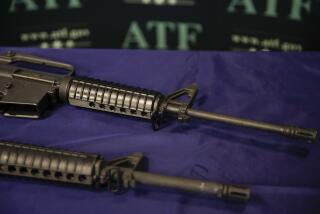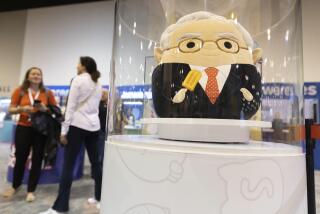Razor Copycat Ban Extended Against 6 Firms
- Share via
Top scooter maker Razor USA on Tuesday won round two of a battle against its competitors when a Los Angeles judge barred six rivals from shipping any more Razor-like products during the critical holiday selling period.
The ruling won’t have much effect on consumers. The order doesn’t affect scooters already in stores and retailers say they have plenty on hand for the holiday season.
U.S. District Court Judge Manuel Real issued a preliminary injunction that keeps alive Razor’s claims that the other scooter manufacturers infringed its patented design.
Six defendants named in the original order settled with Razor, agreeing to pay royalties on sales of existing products and to change the design of any new scooters, said Razor lawyer Brian Sieve of Kirkland & Ellis in Chicago.
The sales ban could be devastating for the scooter makers since it lasts through their most important selling season. Scooters are expected to be the hottest toy trend this year. In the fickle toy market, what’s hot one season tends to be cool by the next. So even if the six scooter makers prevail, it will be after a trial set for Jan. 30, when the toy could be well past its prime.
Look-alikes have always been a mainstay of the hit-driven toy industry, in which one company strikes on something good and dozens rush out to cash in on the craze.
Lawsuits over copycats are almost as common; delaying a competitor’s sales is often more important than winning the claim in the long run, given the relatively short shelf life of a hot toy.
Often, those suits come just before the holiday season to prevent rivals from changing their products in time to make the seasonal sales. But waiting to sue also carries a risk, since many toys are shipped to retailers well before the season begins.
Cerritos-based Razor USA said it had no choice about the timing of its litigation because the company received its patent for the braking system Oct. 31.
The defendants said they will appeal the judge’s ruling even as several of them scrambled to change their product designs to be able to ship them before the trial.
Lawyers said in arguments Monday and Tuesday that their clients will incur huge losses, either from retrofitting their toys, selling them overseas at cut-rate prices or being forced to dispose of the scooters they have not yet shipped.
For Zenital, based in Industry, maker of the Ninja scooter, that means figuring out what to do with 40,000 scooters now stuck in the company’s warehouses.
The company’s attorney estimated that the inventory is worth about $1.6 million, or 25% of Zenital’s business.
“Judge Real is a very intelligent judge, but he does make up his mind early,” said Zenital attorney H.G. Robert Fong. “And once he makes up his mind, it’s very, very hard to turn him around.”
Razor said the defendants unfairly infringed its patented braking system and that two of the group also copied the look of the Razor scooter, including its oval foot-grip pad, rectangular plate, its polished aluminum frame and colored translucent wheels.
In arguments before the court Monday, lawyers for the defendants said Razor’s patent was incorrectly grantedbecause one or several of Razor’s design elements were already in use at the time Razor said it had a unique design worthy of a patent.
Razor USA, which distributes the products made by Taiwan-based JD Corp., predicted it will sell 5 million of the scooters, which cost $80 to $120.
Covered along with Zenital in Tuesday’s ruling was Gen-X Sports Inc. for its Oxygen brand scooters; Wysco Inc. for its JustGo scooters; and K2 Corp., Titan Inc. and Yunn Haaur Enterprises Inc. for their namesake brands.
More to Read
Inside the business of entertainment
The Wide Shot brings you news, analysis and insights on everything from streaming wars to production — and what it all means for the future.
You may occasionally receive promotional content from the Los Angeles Times.










